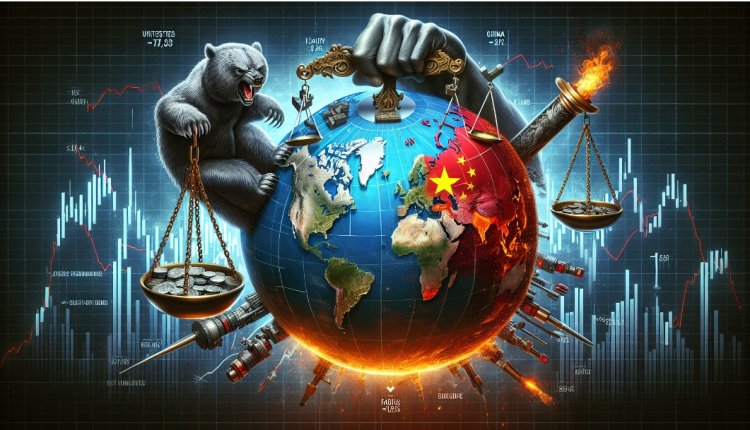The new cold war between US and China: The Global Economy: Challenges and Risks
Chilling winds of a New Cold War? Uncover the economic challenges and risks as the US and China clash on the global stage.

Introduction
The global economy is currently facing several challenges and risks that have the potential to impact countries and individuals worldwide. It is crucial to address these challenges to ensure economic progress and stability. These challenges include trade wars, China's economic decline, and ongoing military conflicts. The importance of addressing these challenges lies in the potential impact they can have on global GDP and the overall state of the global economy. Economic progress is significant because it affects the livelihoods of individuals and the prosperity of nations.
Trade wars between the United States and China have harmed global GDP. Tariffs imposed by both countries have disrupted global trade and led to a decline in economic growth. The World Trade Organisation estimates that the trade war has already caused a 0.1% decrease in global GDP. However, this figure does not capture the full extent of the economic consequences, as the trade war also threatens globalization and forces countries to realign their trade policies.
China's economic decline is another major risk to the global economy. As the world's second-largest economy, China's struggles can have widespread implications. Sluggish growth, rising unemployment rates, and increasing loan defaults have all contributed to China's economic decline. This decline not only affects China but also other major economies that depend on its market and consumer demand.
Military conflicts around the world pose a significant risk to the global economy. Recent conflicts, such as the Russia-Ukraine war and the Israel-Hamas conflict, have already resulted in substantial losses. The Russia-Ukraine war, in particular, has cost trillions of dollars in economic losses. Ongoing military conflicts threaten to escalate and spread, leading to even greater economic consequences.
In conclusion, the global economy faces three major challenges and risks: trade wars, China's economic decline, and military conflicts. Addressing these challenges is crucial for ensuring economic progress and stability. These challenges have already had an impact on global GDP and threaten the overall state of the global economy. It is essential to find solutions and mitigate the risks to foster economic growth and prosperity.
Section 1: The Trade War
The trade war between the United States and China has had a significant impact on the global economy. It is important to understand the background of this trade war to grasp its consequences.
The trade war began in 2018 when the US imposed tariffs on Chinese goods, and China responded with its own set of tariffs. This escalation of trade tensions disrupted global trade and led to a decline in economic growth. The World Trade Organisation estimates that the trade war has already caused a 0.1% decrease in global GDP. However, this figure does not fully capture the economic consequences, as the trade war also threatens globalisation and forces countries to realign their trade policies.
The impact of the trade war on global GDP and trade policies cannot be understated. It has created uncertainty and volatility in the global market, affecting businesses and individuals worldwide. The trade war has led to a decline in international trade and investment, limiting economic growth and opportunities.
Efforts to fix the trade war have been made under the Biden administration. President Biden has taken steps to reverse some of the tariffs imposed by his predecessor and has engaged in discussions with Chinese President Xi Jinping to ease tensions. However, these efforts have not yet resulted in a resolution.
China's targeting of American businesses has added another layer of complexity to the trade war. China has been accused of unfair trade practices, intellectual property theft, and forced technology transfer. This has further strained the relationship between the two countries and led to increased scrutiny of Chinese companies operating in the US.
The economic impact and consequences of the trade war are far-reaching. Businesses have faced higher costs due to tariffs, supply chain disruptions, and uncertainty. Higher prices and fewer options have also impacted consumers. The trade war has disrupted global supply chains, leading to job losses and economic instability in various industries.
In conclusion, the trade war between the US and China has had a significant impact on the global economy. It has disrupted trade, affected global GDP, and forced countries to reassess their trade policies. Efforts to fix the trade war are ongoing, but the economic consequences and uncertainties persist. It is crucial to find solutions and mitigate the risks in order to foster economic growth and stability.
Section 2: China's Economic Decline
China's economy, as the second-largest in the world, has been experiencing a decline in recent years. This decline is attributed to several factors, including sluggish growth, high unemployment rates, and increasing loan defaults.
China's sluggish growth has been a cause for concern as it has a ripple effect on the global economy. The slowdown in China's economic growth has led to a decrease in global GDP and disrupted global trade. This has impacted major economies that rely on China's market and consumer demand.
Another contributing factor to China's economic decline is the high unemployment rate. The rise in unemployment has resulted in decreased consumer spending and lower economic output. This has created a vicious cycle, as reduced consumer spending leads to decreased business revenues and job losses, further exacerbating the unemployment problem.
In addition to sluggish growth and high unemployment, China is also grappling with increasing loan defaults. The country has blacklisted over 8 million individuals who have defaulted on loans, both in households and businesses. This has led to stricter financial regulations and repercussions for defaulters, including restrictions on purchasing plane tickets and making mobile payments.
China's economic decline has not only impacted the country itself but also major economies around the world. The global impact of China's decline can be seen in downgraded economic forecasts in Japan, South Korea, and Thailand. These countries heavily rely on trade with China and have experienced a decrease in exports and business opportunities as a result of China's economic struggles.
Overall, China's economic decline poses significant challenges and risks to the global economy. Sluggish growth, high unemployment rates, and increasing loan defaults are contributing factors to this decline. The repercussions of China's decline are felt globally, with major economies experiencing downgrades in economic forecasts and trade disruptions. Mitigating these risks and finding solutions will be crucial for fostering economic growth and stability worldwide.
Section 3: Military Conflicts
Military conflicts around the world pose a significant risk to the global economy. Two recent conflicts that have garnered attention are the Russia-Ukraine war and the Israel-Hamas conflict.
The Russia-Ukraine war has already resulted in substantial economic losses, with trillions of dollars in damages. Ongoing conflicts threaten to escalate and spread, leading to even greater economic consequences.
The Israel-Hamas conflict is another military conflict that has had economic implications. The ongoing conflict has the potential to cost the world another trillion dollars, and there is a risk of it spreading and turning into a wider regional conflict.
These military conflicts have not only caused economic losses but have also created uncertainties in the global economy. The threat of escalation and the spread of conflicts leads to volatility in financial markets and disrupts trade and investment. This uncertainty hinders economic growth and stability.
Furthermore, these conflicts have implications for the global economy and stability. They can disrupt global supply chains, leading to job losses and economic instability in various industries. They can also impact investor confidence and lead to capital flight, further exacerbating economic challenges.
Resolving these conflicts is crucial for economic growth. By finding peaceful solutions and promoting diplomacy, countries can reduce economic losses, stabilise financial markets, and create a conducive environment for economic progress.
In conclusion, military conflicts such as the Russia-Ukraine war and the Israel-Hamas conflict pose significant risks to the global economy. These conflicts have already resulted in economic losses and uncertainties. Resolving these conflicts through peaceful means is important for fostering economic growth, stability, and investor confidence.
Section 4: Impact on Businesses and Investments
The global challenges and risks discussed in the previous sections have had a significant impact on businesses and investments worldwide. Businesses of all sizes and industries have suffered from the uncertainty and loss of confidence these difficulties have caused.
One of the key effects of these challenges is the loss of confidence and uncertainty for businesses. Trade wars, China's economic decline, and military conflicts have created a volatile business environment, making it difficult for businesses to plan for the future and make long-term investments. This uncertainty can lead to a decrease in business activity, investment, and job creation.
The effects of these challenges are particularly evident in stock markets and among investors. Due to the uncertainty resulting from trade wars and military conflicts, stock markets have experienced increased volatility and fluctuations. Investors are hesitant to make long-term investments, as the risks associated with these challenges make it difficult to predict future returns.
A notable impact of these challenges is the withdrawal of major companies from affected markets. Many companies have pulled out of markets experiencing trade wars, economic decline, and military conflicts due to the risks involved. These companies recognise the importance of stability and predictability for their operations and have made the decision to exit these markets to protect their investments and safeguard their business interests.
Stability and predictability are crucial for businesses to thrive and make informed decisions. Without stability, businesses face difficulties in planning for the future, formulating growth strategies, and attracting investment. Predictability is equally important, as it allows businesses to anticipate market conditions and adjust their operations accordingly.
In conclusion, the challenges and risks facing the global economy have had a significant impact on businesses and investments. Businesses of all sizes and industries have suffered from the loss of confidence and uncertainty brought on by these challenges. Stock markets and investors have experienced increased volatility and fluctuations, and major companies have pulled out of affected markets. Stability and predictability are critical for businesses to thrive and make informed decisions. It is essential to address these challenges and mitigate their risks to foster economic growth, stability, and prosperity for businesses worldwide.
Section 5: The European Union Summit Drama
Overview of the European Union Summit in Brussels:
Hungary's opposition to Ukraine's membership talks and long-term assistance dominated the recent European Union Summit in Brussels with drama and heated debates. The summit brought together EU leaders to discuss various issues, including Ukraine's potential accession to the EU and the provision of financial aid to support its development.
Focus on Hungary's opposition to Ukraine's membership talks and long-term aid:
Hungary's Prime Minister, Viktor Orban, stood out during the summit by opposing Ukraine's membership talks and long-term aid. Orban argued that the timing was not right and expressed concerns about the potential consequences for Hungary. He believed that Hungary should not be forced to make a decision that could have negative implications for the country.
Negotiations and surprising outcomes:
The negotiations surrounding Ukraine's membership talks and long-term aid were tense, with Hungary's opposition casting doubt on the outcome. However, in a surprising turn of events, a solution was found that allowed the talks to proceed without Hungary's veto. German Chancellor Olaf Scholz proposed that Orban temporarily leave the room during the vote, allowing the remaining 26 members to vote in favour of Ukraine's accession talks.
Implications of Hungary's stance and potential consequences for Ukraine:
Hungary's opposition to Ukraine's membership talks and long-term aid has raised concerns about unity and solidarity within the EU. It has also sparked debates about the influence of individual member states in shaping the EU's decisions. The outcome of the summit has significant implications for Ukraine, as it advances its efforts to join the EU and seeks economic support for its long-term development.
Role of bilateral agreements and future discussions on aid:
With Hungary's veto on long-term aid, bilateral agreements between individual EU member states and Ukraine may play a crucial role in providing the necessary financial support. These agreements make it possible to provide assistance that is more specifically targeted, which might help close the gap Hungary's opposition has created. Future discussions on aid will need to address Hungary's concerns and find a way to ensure that Ukraine receives the necessary support for its development.
Section 6: Decline of Hong Kong
Hong Kong, once a major financial hub, is experiencing a decline in its economic status. This decline can be attributed to several factors, including China's policies and the loss of investor confidence.
Discussion of Hong Kong's decline as a major financial hub
Hong Kong has long been known as a global financial centre, attracting investors and businesses from around the world. However, in recent years, its status as a major financial hub has declined. This can be seen in the decreasing number of multinational companies operating in the city and the declining stock market performance.
Factors contributing to the decline and impact of China's policies
China's policies, particularly its increased control over Hong Kong's governance and its crackdown on pro-democracy activists, have had a significant impact on the city's decline. The implementation of the National Security Law and the targeting of foreign businesses have created uncertainty and led to a loss of investor confidence.
Loss of investor confidence and business relocation
The decline of Hong Kong as a major financial hub has resulted in a loss of investor confidence. Many businesses, particularly American companies, have chosen to relocate their operations to other countries to avoid the risks associated with operating in Hong Kong. This has further impacted the city's economy and reputation as a global financial centre.
Examples of major economic indicators reflecting the decline
Several major economic indicators reflect the decline of Hong Kong as a major financial hub. The stock market, for instance, has seen a significant decrease in performance compared to other major global markets. Additionally, foreign direct investment in the city has declined, further contributing to the economic downturn.
Implications for Hong Kong and the global economy
The decline of Hong Kong as a major financial hub has significant implications for both the city and the global economy. Hong Kong's economy, once a driving force in the region, is now struggling due to the loss of investor confidence and business relocations. The global economy is also impacted, as the decline of a major financial center can lead to financial instability and affect international trade and investment.
In conclusion, the decline of Hong Kong as a major financial hub is a result of various factors, including China's policies and the loss of investor confidence. The city's economic indicators reflect this decline, with implications for both Hong Kong and the global economy. It is essential to address these challenges and find solutions to revive Hong Kong's economy and restore its status as a global financial centre.
Section 7: Britain's Energy Relationship with Russia
Britain has a complex energy relationship with Russia, which has been a topic of controversy and debate. Here is an overview of Russia's energy business with Britain:
-
Russia is a major supplier of natural gas to Britain. The country is heavily dependent on Russian gas imports, which account for a significant portion of its energy needs.
-
One of the key players in Russia's energy business is Gazprom, a state-controlled gas company. Gazprom operates in British territory and supplies gas to the country.
However, Gazprom's operations in British territory have been a source of controversy. There have been allegations of unfair practices, intellectual property theft, and forced technology transfer. These controversies have raised concerns about Britain's energy security and its reliance on Russian gas.
The repercussions of Gazprom's operations in British territory have caused an uproar in London. Many politicians and activists have called for stricter regulations and oversight to address these concerns.
Furthermore, the controversy surrounding Gazprom's operations in British territory has had broader implications for Russia's war and economy. Some argue that the revenue generated from Gazprom's operations has contributed to funding Russia's military activities, including its war in Ukraine.
The implications for Britain and its relationship with Russia are significant. The controversy surrounding Gazprom's operations has strained bilateral relations and raised questions about the country's energy security. It has also highlighted the need for diversification of energy sources and a reduction in dependence on Russian gas.
In conclusion, Britain's energy relationship with Russia, particularly through Gazprom's operations in British territory, has sparked controversy and uproar in London. The implications for both countries are significant, and Britain must address these concerns and explore alternative energy sources to ensure energy security and reduce dependence on Russian gas.
Section 8: Hindu President in the US?
When VI Ramaswami, a Hindu Republican candidate for president, was asked if a Hindu could effectively lead the United States, he provided an insightful response. Ramaswami stated that he is proud of his Hindu identity and emphasised that Hinduism shares a common set of values with Christianity. He believes that each individual has a unique purpose in life and that God works through everyone, regardless of their religion. While Ramaswami acknowledged that he may not be the best president to spread Christianity, he emphasised that the president's role is to make policy decisions and ensure the safety and prosperity of the nation.
The question of whether a non-Christian could effectively lead the United States raises broader discussions about the relevance of religion in American politics. The United States is a majority Christian-country, and many political leaders have been Christians. However, the Constitution separates church and state, and religious freedom is a fundamental right. Therefore, a candidate's religion should not be the sole determinant of their ability to lead the country.
Ramaswami's response highlights the significance of religious diversity in American politics. As the country becomes more diverse, with a growing population of non-Christians, it is essential to consider the implications and potential challenges for non-Christian presidential candidates. A Hindu president, or a president of any non-Christian faith, would face scrutiny and potential discrimination. However, their ability to effectively lead should be based on their qualifications, policies, and ability to represent and serve the American people.
The public response to Ramaswami's answer has been positive, with many praising his honesty and proud affirmation of his Hindu identity. However, his popularity in the polls remains relatively low compared to other candidates. This highlights the challenges and biases that non-Christian candidates may face in gaining widespread support.
In conclusion, the question of whether a Hindu or a non-Christian could be an effective president in the United States is a complex one. Ramaswami's response emphasises the importance of religious diversity and the need to evaluate candidates based on their qualifications and policies rather than solely on their religious affiliation. While progress has been made in promoting religious freedom and diversity, there are still challenges and biases that non-Christian candidates may face. Ultimately, the American people will decide the future of the presidency based on their values and priorities.
Section 9: Changing the French Language in Former French Colonies
Overview of the changing French language in former French colonies:
In the former French colonies of Africa, the French language is undergoing significant changes. As these countries gain independence and develop their own cultural identities, the influence of local African languages on French has become more prominent.
Discussion of the influence of local African languages on French:
Local African languages have had a significant impact on the French language in former French colonies. This influence can be seen in various aspects of the language, including vocabulary, pronunciation, and grammar. African words and expressions are being incorporated into everyday French speech, giving rise to a unique African-French dialect.
Statistics on the number of French speakers in Africa and future projections:
Africa is home to a large number of French speakers, with approximately 60% of all French speakers residing on the continent. This number is expected to increase in the future, with projections indicating that 80% of the world's French speakers will be Africans. This demonstrates the growing importance of Africa in the French-speaking world.
Examples of Africanism in the French language:
The influence of local African languages on French can be seen through the use of Africanisms, which are African words, phrases, and cultural references that have been integrated into the French language. These Africanisms add richness and diversity to the French language, reflecting the cultural heritage of Africa.
Implications for the French language and cultural identity:
The changing French language in former French colonies has implications for both the language itself and the cultural identity of these countries. It represents a shift towards linguistic and cultural independence as African languages and expressions are incorporated into the French language. This evolution reflects the unique cultural identities of these countries and their desire to shape their own linguistic and cultural landscapes.



 admin
admin 










